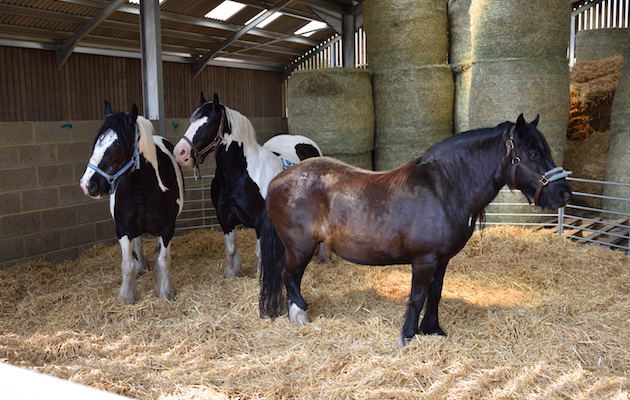Horse & Hound news editor Eleanor Jones shares her views on the British Equine Veterinary Association’s new pilot scheme designed to combat the life-threating risk that obesity holds for too many horses through the UK
Equine obesity is a big issue. Vets have said they put down more horses from related conditions than any other, but it is a preventable disease – and it’s man-made. Whether it’s down to the way they are kept, and possibly the stigma associated with owning a skinny horse, the problem is not getting any better.
{"content":"PHA+SG9yc2VzIGV2b2x2ZWQgdG8gbG9zZSB3ZWlnaHQgaW4gd2ludGVyLCB3aGVuIHRlbXBlcmF0dXJlcyBkcm9wcGVkIGFuZCBmb29kIGJlY2FtZSBzY2FyY2VyLCBhbmQgcHV0IGl0IG9uIGluIHNwcmluZyBhbmQgc3VtbWVyLCBpbiBwcmVwYXJhdGlvbiBmb3IgdGhlIG5leHQgY29sZCBzZWFzb24uPC9wPgo8cD5CdXQgdGhhbmtzIHRvIHRoZSB3YXkgbWFueSBhcmUga2VwdCBub3csIG9uIGdyYXNzIHRoYXTigJlzIGJlZW4gY29tcGFyZWQgdG8gYmVpbmcg4oCcbGlrZSBzd2VldHPigJ0gYnkgb25lIHZldCwgb2Z0ZW4gb3Zlci1ydWdnZWQsIG92ZXItZmVkIGFuZCB1bmRlci1leGVyY2lzZWQsIG91ciBhbmltYWxzIGFyZSBnZXR0aW5nIGZhdHRlciBhbmQgZmF0dGVyLjwvcD4KPHA+VGhlcmUgaGFzIGJlZW4gYSBodWdlIGFtb3VudCBvZiBncmVhdCB3b3JrIGRvbmUgb24gdGhpcywgYnkgdmV0cyBhbmQgd2VsZmFyZSBjaGFyaXRpZXMsIGJ1dCB2ZXRzIGFyZSBub3Qgc2VlaW5nIGZld2VyIG9iZXNlIGhvcnNlcywgPGEgaHJlZj0iaHR0cHM6Ly93d3cuaG9yc2VhbmRob3VuZC5jby51ay9uZXdzL3ZldHMtdHJpYWwtdHJhZmZpYy1saWdodC1zY2hlbWUtY29tYmF0LWVxdWluZS1vYmVzaXR5LWhoLXBsdXMtNzA0NjYxIj5oZW5jZSB0aGUgbmV3IGluaXRpYXRpdmU8L2E+LCB3aGljaCBpcyB0YWtpbmcgYSBkaWZmZXJlbnQgYW5nbGUuPC9wPgo8cD48ZGl2IGNsYXNzPSJhZC1jb250YWluZXIgYWQtY29udGFpbmVyLS1tb2JpbGUiPjxkaXYgaWQ9InBvc3QtaW5saW5lLTIiIGNsYXNzPSJpcGMtYWR2ZXJ0Ij48L2Rpdj48L2Rpdj48c2VjdGlvbiBpZD0iZW1iZWRfY29kZS0zMSIgY2xhc3M9ImhpZGRlbi1tZCBoaWRkZW4tbGcgcy1jb250YWluZXIgc3RpY2t5LWFuY2hvciBoaWRlLXdpZGdldC10aXRsZSB3aWRnZXRfZW1iZWRfY29kZSBwcmVtaXVtX2lubGluZV8yIj48c2VjdGlvbiBjbGFzcz0icy1jb250YWluZXIgbGlzdGluZy0tc2luZ2xlIGxpc3RpbmctLXNpbmdsZS1zaGFyZXRocm91Z2ggaW1hZ2UtYXNwZWN0LWxhbmRzY2FwZSBkZWZhdWx0IHNoYXJldGhyb3VnaC1hZCBzaGFyZXRocm91Z2gtYWQtaGlkZGVuIj4NCiAgPGRpdiBjbGFzcz0icy1jb250YWluZXJfX2lubmVyIj4NCiAgICA8dWw+DQogICAgICA8bGkgaWQ9Im5hdGl2ZS1jb250ZW50LW1vYmlsZSIgY2xhc3M9Imxpc3RpbmctaXRlbSI+DQogICAgICA8L2xpPg0KICAgIDwvdWw+DQogIDwvZGl2Pg0KPC9zZWN0aW9uPjwvc2VjdGlvbj48L3A+CjxwPkFzIGhhcyBiZWVuIHBvaW50ZWQgb3V0LCBpdCBpcyBub3QgdGhhdCBvd25lcnMgaW50ZW5kIHRvIG1pc3RyZWF0IHRoZWlyIGhvcnNlcywgaXTigJlzIGluIG1vc3QgY2FzZXMgZW50aXJlbHkgdGhlIG9wcG9zaXRlLjwvcD4KPHA+QSBtYWpvciBwYXJ0IG9mIHRoZSBwcm9ibGVtIGlzIGFudGhyb3BvbW9ycGhpc20uIFdoZW4gdGhlIHdlYXRoZXIgaXMgYmFkLCB0aGUgbmF0dXJhbCBpbmNsaW5hdGlvbiBpcyB0byB3YW50IHRoZW0gaW4sIOKAnHR1Y2tlZCB1cCBhbmQgY29zeeKAnSwgbmljZSBhbmQgd2FybSBpbiBhIHRoaWNrIHJ1Zywgd2l0aCBwbGVudHkgdG8gZWF0LiBXZeKAmXZlIGFsbCBiZWVuIGd1aWx0eSBvZiB0aGlua2luZywgaWYgc3ViY29uc2Npb3VzbHksIHRoYXQgd2XigJlyZSBjb2xkIHNvIHN1cmVseSB0aGUgaG9yc2UgbXVzdCBiZSB0b28sIGFuZCBjaHVja2luZyBhIHRoaWNrZXIgcnVnIG9uIHRoYW4gbWF5IGJlIG5lZWRlZC48L3A+CjxwPkJ1dCB0aGlzIGlzIGEgY2FzZSBvZiBkb2luZywgd2l0aCB0aGUgYmVzdCBpbnRlbnRpb25zLCB3aGF0IHdlIHRoaW5rIHdpbGwgbWFrZSBhIGhvcnNlIGhhcHB5LCByYXRoZXIgdGhhbiB3aGF0IHRoZXkgYWN0dWFsbHkgd2FudCBhbmQgbmVlZC4gTWFueSBwZW9wbGUgaGF2ZSByZXBvcnRlZCB0aGF0IGlmIGhvcnNlcyBhcmUgdHVybmVkIG91dCBpbiBhIGZpZWxkIHdpdGggYSBzaGVsdGVyLCB0aGV5IGRvbuKAmXQgdXNlIGl0IGluIHRoZSByYWluIGFuZCB3aW5kIHdoZW4gd2UgdGhpbmsgdGhleeKAmWQgd2FudCB0byBiZSBpbiB0aGUgZHJ5OyB0aGV54oCZbGwgb25seSBzZWVrIHRoZSBzaGFkZSBvdXQgb24gaG90IHN1bW1lciBkYXlzLjwvcD4KPGRpdiBjbGFzcz0iYWQtY29udGFpbmVyIGFkLWNvbnRhaW5lci0tbW9iaWxlIj48ZGl2IGlkPSJwb3N0LWlubGluZS0zIiBjbGFzcz0iaXBjLWFkdmVydCI+PC9kaXY+PC9kaXY+CjxwPjxhIGhyZWY9Imh0dHBzOi8vd3d3LmhvcnNlYW5kaG91bmQuY28udWsvZmVhdHVyZXMvaG9yc2UtcmVhbGx5LW5lZWQtd2Vhci1ydWctNjAzMTAzIj5Ib3JzZXMgaGF2ZSBhIHdpZGVyIHRoZXJtby1uZXV0cmFsIHpvbmUgdGhhbiB3ZSBkbzwvYT4g4oCTIHRoZSByYW5nZSBvZiB0ZW1wZXJhdHVyZSBhdCB3aGljaCB0aGV5IGZlZWwgbmVpdGhlciB0b28gaG90IG5vciB0b28gY29sZCAobGluaykg4oCTIGFuZCBmb29kIGtlZXBzIHRoZW0gd2FybS4gVGhleSB1c2UgYSBsb3Qgb2YgZW5lcmd5IHRvIG1haW50YWluIHRoZWlyIHRlbXBlcmF0dXJlIGluIHdpbnRlciwgYW5kIGlmIHRoZXkgZG9u4oCZdCBuZWVkIHRvLCBpZiB0aGV54oCZcmUgdG9vIHdhcm0sIHdlaWdodCBnYWluIGNhbiBiZSB0aGUgcmVzdWx0LjwvcD4KPHA+QnV0IGhvdyBkbyB5b3UgY2hhbmdlIHVuZGVybHlpbmcgYmVoYXZpb3VyIGFuZCBhdHRpdHVkZT8gSW4gZ2VuZXJhbCwgeW914oCZbGwgYmUgZmFyIG1vcmUgbGlrZWx5IHRvIGdldCBzdGljayBvbiBhIGxpdmVyeSB5YXJkIGlmIHlvdXIgaG9yc2UgaXMgYSBiaXQgdGhpbiByYXRoZXIgdGhhbiBvdmVyd2VpZ2h0LCB0aGUgdmVyeSBsYW5ndWFnZSB3ZSB1c2U7IOKAnGhlIGxvb2tzIHdlbGzigJ0gZm9yIGEgd2VsbC1jb3ZlcmVkIGFuaW1hbCwgZG9lcyBub3QgaGVscCwgYW5kIGJlY2F1c2Ugd2UgbG92ZSBvdXIgaG9yc2VzLCB3ZSB3YW50IHRvIGxvb2sgYWZ0ZXIgdGhlbSwgdG8ga2VlcCB0aGVtIHdhcm0gYW5kIHdlbGwtZmVkLCBldmVuIGlmIHdlIGNvdWxkIGJlIGtpbGxpbmcgdGhlbSB3aXRoIGtpbmRuZXNzLjwvcD4KPGRpdiBjbGFzcz0iYWQtY29udGFpbmVyIGFkLWNvbnRhaW5lci0tbW9iaWxlIj48ZGl2IGlkPSJwb3N0LWlubGluZS00IiBjbGFzcz0iaXBjLWFkdmVydCI+PC9kaXY+PC9kaXY+CjxwPkl0IHNlZW1zIHRoZXJlIGlzIHJlbHVjdGFuY2UgdG8gc2F5IGEgaG9yc2UgaXMgY2FycnlpbmcgZXhjZXNzIHdlaWdodCwgYW5kIG9mZmVuY2UgdGFrZW4gaWYgc29tZW9uZSBkb2VzIHBvaW50IGl0IG91dC4gV2h5PyBZb3UgY2Fu4oCZdCBmYXQtc2hhbWUgYSBob3JzZSwgaGUgd29u4oCZdCB0YWtlIGl0IHRvIGhlYXJ0IGlmIHNvbWVvbmUgc2F5cyBoZeKAmXMgY2FycnlpbmcgYSBmZXcgZXh0cmEgcG91bmRzLCBzbyB3aHkgYXJlIHBlb3BsZSBpbnN1bHRlZCBpZiB0aGV54oCZcmUgd2FybmVkLCBpbiBnb29kIHRpbWUsIHRoYXQgdGhlaXIgaG9yc2XigJlzIGhlYWx0aCBjb3VsZCBiZSBhdCByaXNrIHNvIHRoZXnigJl2ZSBnb3QgYSBjaGFuY2UgdG8gZG8gc29tZXRoaW5nIGFib3V0IGl0PzwvcD4KPGRpdiBjbGFzcz0iYWQtY29udGFpbmVyIGFkLWNvbnRhaW5lci0tbW9iaWxlIj48ZGl2IGlkPSJwb3N0LWlubGluZS01IiBjbGFzcz0iaXBjLWFkdmVydCI+PC9kaXY+PC9kaXY+CjxwPjxhIGhyZWY9Imh0dHBzOi8vd3d3LmhvcnNlYW5kaG91bmQuY28udWsvZmVhdHVyZXMvaG9yc2Utd2VpZ2h0LWxvc3MtdGlwcy02NzU2NDQiPk5vdyBpcyB0aGUgdGltZSB0byBhY3Q8L2E+LCBhcyBpdCBpcyBlYXNpZXIgdG8gcHJldmVudCB3ZWlnaHQgZ2FpbiB0aGFuIHRvIGdldCBpdCBvZmYgb25jZSBpdOKAmXMgdGhlcmUuIFdpbnRlciBpcyB0aGUgaWRlYWwgdGltZSwgdG8gdGFrZSBhZHZhbnRhZ2Ugb2YgY29uZGl0aW9ucyBhbmQgcHV0IHlvdXIgaG9yc2UgaW4gYSBwb3NpdGlvbiB3aGVyZSBpdCBjYW4gZ28gaW50byBzcHJpbmcgY2FycnlpbmcgbGVzcyB3ZWlnaHQsIHJlYWR5IGZvciB3aGVuIHRoZSBncmFzcyBjb21lcyB0aHJvdWdoLiBIb3BlZnVsbHksIHRoaXMgQkVWQSBzY2hlbWUsIHdoaWNoIGlzIG9uIGEgc2l4LW1vbnRoIHBpbG90LCB3aWxsIG1ha2UgaXQgcG9zc2libGUgdG8gc3RhcnQgdGhlIGNvbnZlcnNhdGlvbnMgYW5kIGJlZ2luIHRvIGNoYW5nZSBhdHRpdHVkZXMuPC9wPgo8cD5BcyBhbm90aGVyIGxlYWRpbmcgdmV0IHNhaWQsIG5vIGhvcnNlIGV2ZXIgZGllZCBmcm9tIGJlaW5nIGEgYml0IGxlYW4gaW4gRmVicnVhcnkuIFRoZSBzYW1lIGNhbuKAmXQgYmUgc2FpZCBmb3IgdGhlIG90aGVyIGVuZCBvZiB0aGUgc2NhbGUuPC9wPgo8cD4K"}
What do you think is the key reason vets are not seeing a reduction in the number of obese horses? Let us know your views by emailing hhletters@ti-media.com with your name and nearest town for the chance to be featured in the letters page a future issue of Horse & Hound magazine…
You may also be interested in…
Credit: .
The British Equine Veterinary Association is launching a six-month pilot of a new scheme designed to tackle equine obesity from
The owner is urging others to take action on overweight horses
Half our horses could be obese — and many owners are blind to the problem. So found a recent study
Credit: Redwings Horse Sanctuary
‘In loving our animals too much we are exposing them unnecessarily to potentially fatal diseases’
Stay in touch with all the news in the run-up to and throughout the major shows and events during 2026 and beyond with a Horse & Hound subscription. Subscribe today for all you need to know ahead of these major events, plus online reports on the action as it happens from our expert team of reporters and in-depth analysis in our special commemorative magazines. Have a subscription already? Set up your unlimited website access now
H&H news editor
Eleanor is an experienced journalist who spent over eight years working for local and national newspapers before joining H&H as news editor in March 2016. Passionate about equine welfare and exposing the truth, Eleanor has reported on all aspects of the industry, from Brexit to anti-bullying campaigns, and from dressage rules to mules. Her sport of choice is showjumping, in which she competes her own horses, and she also enjoys reporting at local jumping shows through to international championships.





